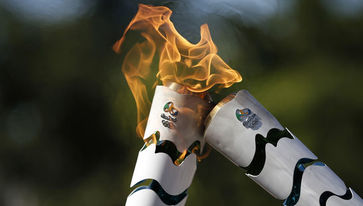
So what is religious about all of this? In what sense can this be called civic religion? The phrase comes from Anthony Moretti, an associate professor at from Robert Morris University who has written about the Olympic Games as a form of civic religion. Certainly the history of the Olympic Games shows their connection to religion. The original Greek games included worship and dedication to the Greek gods and were only stopped after they were banned by a Christian Emperor because they were pagan. They were revived in the 19th century by a French aristocrat, Pierre de Coubertin, as a way of promoting peace among nations and much of their rituals, like the reverential lighting of the Olympic flame look suspiciously like religion. But of course there’s much that is irreligious about them as we know from doping scandals, multi-national sponsors, one country trying to outdo another in spectacular opening and closing ceremonies, athlete’s villages, sports arenas and velodromes etc. Commercialism and materialism are very evident, so much so that those who reflect on such things think the Games have lost their soul.
Perhaps this soul can be recovered. I’m not sure if Popes usually send a message to the Games but this year Pope Francis sent a video in which he recognised the important role sport can have in building world peace. He said
“ In a world thirsting for peace, tolerance, and reconciliation, I hope that the spirit of the Olympic Games inspires all - participants and spectators - to "fight the good fight" and finish the race together (cf. 2 Tim 4,7-8), desiring to obtain as a prize, not a medal, but something much more precious: the construction of a civilisation in which solidarity reigns and is based upon the recognition that we are all members of the same human family, regardless of the differences of culture, skin colour, or religion.”
What I found so moving about the opening ceremony was the sense of people transcending these differences, joyfully welcoming them, united in their hopes, focussed on something greater than themselves and participating in a common ritual which at least for that moment witnessed to the best side of their humanity and their desire to live up to it.
Because of the time differences another ‘civic religious’ event was happening more or less at the same time as the opening of the Olympic Games. This time it was taking place in Japan and remembering the horrors of the bomb that destroyed Hiroshima seventy-one years ago. I’ve been to Hiroshima and seen the effects of that bomb. The museum and memorial graphically depict the horror of nuclear weapons. You would think that such things as the sight of people vapourised as a result of the bomb, the toys of children killed as they played, the evidence of radiation sickness would be enough to stop the proliferation of nuclear weapons. And yet my country, or at least the Westminster Government, has voted to renew the nuclear Trident missiles (at an obscene amount of money) based in a most beautiful and peaceful part of Scotland. Soon the UN General Assembly will decide whether to begin negotiations about a treaty to ban nuclear weapons. It seems a no-brainer to me but it’s unlikely to have a smooth ride. Yet what a wonderful contribution to world peace it would be and what an amazing amount of money could be diverted to other areas of concern.
Every year Japan remembers those who died and the horrors of nuclear war but it also demonstrates its desire and commitment to world peace. Each August 6th there is a civic ceremony in Hiroshima during which doves of peace are released at 8.15 am, the same time that the bomb fell on unsuspecting citizens; a Peace Bell is rung and all citizens are asked to “offer silent prayers for one minute to appease the souls of those killed by the atomic bomb and to pray for eternal peace on Earth. During the ceremony, the Peace Declaration, appealing for the abolition of nuclear weapons and for the realization of eternal world peace, is delivered by the Mayor of Hiroshima City and transmitted worldwide. But even the Japanese government is beginning to renege on this, now wanting to send troops to troubled parts of the world – no doubt to protect their own interests – something that has led to public demonstrations which are not usual in Japan.
It strikes me that this too was a moment in which those attending the ceremony, and those praying in solidarity with it throughout the world, were transcending differences, recognising their common humanity, sharing a common pain and horror of what war can do, uniting in their hopes for a better future, focussing on something greater than themselves and participating in a common ritual which at least for that moment witnessed to the best side of their humanity and their desire to live up to it – all elements of what could be called civic religion. Why I like the phrase so much is because I have often thought that we need a way of celebrating our common citizenship which is inclusive and welcoming of all. I have participated often in interfaith ceremonies which try to do this by including a prayer or reading from each of the major faiths with a contribution from someone who would call themselves non-religious. These events have often struck me as unsatisfactory and can seem like an interfaith concert more than a unified religious act. Perhaps the Olympic Games and the Hiroshima service have something to teach us about how to organise and conduct such events with dignity and meaning while we delight in our differences.


 RSS Feed
RSS Feed
